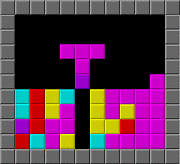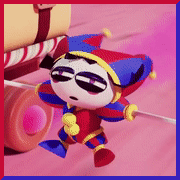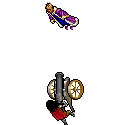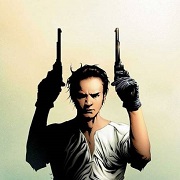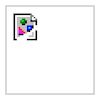|
SpacePig posted:I'm pretty sure he only killed them after he learned they were impersonating the Edema Ruh while doing it. Gotta have priorities.
|
|
|
|

|
| # ? May 13, 2024 08:06 |
|
ChickenWing posted:You may not recall, but earlier I said I'd do a reading with the opposite bias as yours, as I'd never really critically read the series. You've misunderstood what 'critical' means here. Criticism is "the art of estimating the qualities and character of literary or artistic work". You're saying that your reading will not have any insight into or deeper understanding of the books. The reason my critical reading is negative is because Rothfuss's books are demonstrably terrible, whether in matters of style, theme, ideology, etc. BravestOfTheLamps fucked around with this message at 18:57 on Jul 6, 2016 |
|
|
|
ChickenWing posted:You may not recall, but earlier I said I'd do a reading with the opposite bias as yours, as I'd never really critically read the series. I'm really looking forward to this as well. These critical readings are bringing all sorts of life into this thread and I'm loving the new books being suggested so I have something to read on rainy days.
|
|
|
|
orange sky posted:Didn't they also kidnap two girls and torture/abuse them or something? SpacePig posted:I think he knew about the girls from the outset. I'm pretty sure he only killed them after he learned they were impersonating the Edema Ruh while doing it. He poisons the food before any sign of the kidnapped girls appears, or indeed before the fake Ruh show any signs of not being real Ruh other than having stolen a bit of beer. One of the fake Ruh is already sick from the poison before the girls appear, and when they appear Kvothe needs to keep them from eating the food to avoid being poisoned too. He poses the fake Ruh another shibboleth to test if they are real Ruh, but again, only after he has already poisoned the food. Now ~realistically~ ~in real life~, most people you decide to murder for petty theft don't by sheer chance happen to be child rapists who are merely pretending to be members of your ethnic group, because your ethnic group is actually perfect and literally no one in your ethnic group has committed even the pettiest of crimes ever. But despite throwing off the artifical story conventions of "plot", "character", and "good writing", Rothfussland is still not very realistic. Also, even once he's alone with the girls in his tent and there are no witnesses around, he still keeps feeling them up. There's a really loving awful paragraph about him caressing one underage girl's cheek after he drugs her while thinking about how much she looks like Denna and she tries to struggle against him but can't because of "her will surrendering" to unconsciousness and holy poo poo. Lottery of Babylon fucked around with this message at 17:56 on Jul 6, 2016 |
|
|
|
Jesus, I'm gonna have to re-read this book, because I don't remember that at all. I must've just shut out so much of WMF from my brain. Wow.
|
|
|
|
Guys, that scene is fine.
|
|
|
|
Wasn't it written before everything else and that's why it doesn't fit at all in the story? Like it was just a short story about Kvothe Rothfuss had written and decided to throw it into WMF? It may have been bandied around here, but I can't remember if there was a source on it or not.
|
|
|
|
Dienes posted:Gotta have priorities. STOLEN VALOR!
|
|
|
|
Solice Kirsk posted:Wasn't it written before everything else and that's why it doesn't fit at all in the story? Like it was just a short story about Kvothe Rothfuss had written and decided to throw it into WMF? It may have been bandied around here, but I can't remember if there was a source on it or not. Let's once again remind everyone that Rothfuss won't let people edit for content.
|
|
|
|
Atlas Hugged posted:Let's once again remind everyone that Rothfuss won't let people edit for content. How does a guy that wrote one book get that kind of leverage over a publisher though? Do all writers have the ability to tell their editor to hit the bricks?
|
|
|
|
Solice Kirsk posted:How does a guy that wrote one book get that kind of leverage over a publisher though? Do all writers have the ability to tell their editor to hit the bricks? Publishers are mainly interested in profitable art instead of good art.
|
|
|
|
Solice Kirsk posted:Wasn't it written before everything else and that's why it doesn't fit at all in the story? Like it was just a short story about Kvothe Rothfuss had written and decided to throw it into WMF? It may have been bandied around here, but I can't remember if there was a source on it or not. Quite a lot of the jarring tonal shifts and disjointed character of WMF is probably due to this, yes. He appears to have literally just stitched together a handful of disparate short stories together and tweaked them just enough to plausibly fit within his framing story, except not really.
|
|
|
|
Shall we slay the dragon, dear reader? LET’S READ THE KINGKILLER CHRONICLE CRITICALLY Part 29: “...m’lady.” Chapter 75, “Interlude—Obedience,” is another short one: quote:In the Waystone Inn, Kvothe paused expectantly. The moment stretched out until Chronicler looked up from his page. This is something that’s just not logical. Kvothe has claimed that he was the only survivor of a Chandrian attack, but only now he suggests that this story is too outlandish to believe. Chapter 76, “The Mating Habits of the Common Dracchus”, is titled such because Rothfuss is a bit enamoured with the phrase. Kvothe and Denna are on top of the stone looking down on the dragon, safe and back to banter. quote:“It’s not a dragon,” I said. “There’s no such thing as dragons.” quote:After several minutes of snuffing and rolling, the draccus came back to the flat bed of coals that was all that remained of our fire. It circled it a few times, then walked over it and lay down. I cringed, but it just shifted back and forth like a hen settling into a nest. The hilltop below was now entirely dark except for the pale moonlight. Observe once again the mixed tones that end up leaving no impression together. This all would work if Rothfuss wouldn’t insist on a “realistic” mode for comedy. It’s that same indecisiveness. I recall Douglas Adams’s The Long Dark Tea-Time of the Soul managing the same nervous tension with the eagle, while Rothfuss once again stumbles. There is some tolerable comedy in the next chapter: quote:She looked back down below. “It really is an incredible animal.” If you thought that was passable, you’ve been tricked. I’ve edited the conversation to pace it better. Here’s the original passage: quote:She looked back down below. “It really is an incredible animal.” Did I get you? Notice how editing makes Denna impressed and serious, while Kvothe is professional and just slightly irreverent, thus creating a character dynamic. The tone isn’t broken by overt emotive descriptors. But editing can only go so far. The struggle with the dragon is the climax of the book, so the obvious high-minded literary question is what the dragon represents. While the easy answer is “nothing, as usual”, there is a little more to the dragon. It’s a primal force of violence that must be understood and overcome, so it’s a reflection of the Chandrian. Kvothe even provides helpful factoids to Denna in order to allay her fears. If The Name of the Wind is about anything, it’s about how knowledge and understanding differentiate people (fittingly, I am perhaps the first reader to truly understand both this and the book). I say ‘if’, because while the book is occasionally concerned with the nature of knowledge, it has no insight into it and even actively undermines such a theme. The book is occupied with imaginary factoids and tricks, and it boils down to just that. Kvothe’s character is of course central to this problem: he mechanically absorbs or applies knowledge. He’s upbraided many times because he didn’t know better, and that is it. The book promises that he will fly too close to the sun and will be punished for his hubris, but this will only end up a poor imitation of Baudolino were it to be published. The whole quest for the Chandrian is about understanding something great and terrible, but they are not important for their imaginary force but because they are important (like Kvothe). They’re an inexplicable force of violence, but the story isn’t about overcoming violence or trauma, or even understanding it. It’s not hard to miss (yet both critics and fans end up doing just that) that Kingkiller presents a weirdly elitist world view, where there’s a sort of network of people “in the know” and who get to lecture others. Like Kvothe, the Masters of the University, the occasional wise prole who stumbles into the text, etc. This isn’t simply Kvothe being an unreliable narrator, it also extends to the framing story. There are people in the know and then there are ignorant masses milling about the book’s margins. There’s some attempted notes to democratic spirit with the knowledgeable proles, but the people as a whole are an ill-defined body who exist to ignore or applaud Kvothe. If knowledge differentiates people, The Name of the Wind argues that it makes some people more exceptional. But we were talking about a dumb fantasy wank where a magic boy fights a dragon. Do you still remember that Kvothe is a teenager? In Chapter 77, “Bluffs”, the dragon has left and Kvothe and Denna investigate its trail. They stumble onto an isolated cabin, and both it and its owner have been mauled by the dragon. Kvothe soon realises that they’re at a narcotics farm, but not before Denna has already ingested some drugs. It turns out that the dragon has also eaten narcotics and its addiction has driven it mad. What’s remarkable about this chapter is the now familiarly over-described expressions and actions: quote:I turned around and saw Denna standing by one of the firepits. She had pried a large disk of sticky material out of the bottom of one of the pans and taken a bite out of it. It was black, not the deep amber color of maple candy. Turns out that Denna has eaten ophalum, or denner resin, which is the narcotic of choice in the novel, and the coals will help by soaking up the drug. Denna also gives "a wan smile that didn’t touch her frightened eyes at all” instead of simply forcing a smile. quote:I felt for her pulse in her neck. It was racing, which didn’t tell me anything. Mine was racing too. “Look up here.” I gestured with my raised hand and watched her eyes. Her pupils were sluggish responding to the light. I lay my hand on her head and under the pretext of lifting her eyelid a little, I pressed my finger against the bruise on her temple, hard. She didn’t flinch or show the least hint that it pained her. It’s remarkable that even here the conversation becomes about how exceptional Kvothe is. Kvothe is resolved to kill the dragon since it threatens Trebon, while Denna begins to feel the effects of the drug: quote:“But how?” she repeated. “How do you kill a thing like that?” And if you’re curious, no, there’s not going to be apologies for Kvothe daring to help a woman, even though this is more infantilizing than simply rescuing Fela from the fire. In Chapter 78, “Poison,” Kvothe considers the options for killing the dragon, while Denna grows wilder. It’s mainly notable as an example of the poor chaptering, since there’s no reason to have so many in the first place. quote:I turned the scale over in my hands and thought about it. I had wax, and this scale would make as good a link as any hair. I could make a simulacrum of the draccus, but then what? A hotfoot wasn’t going to bother a creature that was perfectly comfortable lying on a bed of coals. ...And for some more indecisive burlesquing. Chapter 79, “Sweet Talk,” continues with that infantilizing note while Kvothe and Denna build a fire to attract the dragon. Kvothe chastely protects Denna, who reveals that her mysterious patron struck her during the Chandrian attack so that the townsfolk of Trebon wouldn’t find It suspicious that she survived unscathed. By the way, fans theorize that the mystery patron, Master Ash, is one of the Chandrian. But let’s focus on how Denna is almost likened to Kvothe’s moon fey Auri, a beautifully damaged woman whom Kvothe feels the urge to protect: quote:We crossed the same small stream that we had before, and, despite the fact that it wasn’t much more than ankle deep, Denna insisted on bathing. I washed up a little, then moved a discreet distance away and listened to her sing several rather racy songs. She also made several none-too-subtle invitations that I could join her in the water. quote:We sat for a while longer, staring off into the dark. Denna nodded a little, then pulled herself upright again and fought off another violent shiver. “I know you don’t think of me…” She trailed off. quote:Denna stirred in her sleep. “I know you didn’t mean it,” she said clearly. It’s possible that Kvothe is an unreliable narrator and this is satirical, but even if the case is so, the writing undermines that. The narration rendered in exact, pedantic, detail with Kvothe’s comments almost fringing it instead of constructing it. This is where a writer should underline the subjective experience of the situation, but Rothfuss is occupied with constant details of eyes, tone of voice, pain, etc. This is how William Thackeray shows the eponymous protagonist of Barry Lyndon to be a petty monster, in Barry’s own words: quote:The first days of a marriage are commonly very trying; and I have known couples, who lived together like turtle-doves for the rest of their lives, peck each other's eyes out almost during the honeymoon. I did not escape the common lot; in our journey westward my Lady Lyndon chose to quarrel with me because I pulled out a pipe of tobacco (the habit of smoking which I had acquired in Germany when a soldier in Billow's, and could never give it over), and smoked it in the carriage; and also her Ladyship chose to take umbrage both at Ilminster and Andover, because in the evenings when we lay there I chose to invite the landlords of the 'Bell' and the 'Lion' to crack a bottle with me. Lady Lyndon was a haughty woman, and I hate pride; and I promise you that in both instances I overcame this vice in her. On the third day of our journey I had her to light my pipematch with her own hands, and made her deliver it to me with tears in her eyes; and at the 'Swan Inn' at Exeter I had so completely subdued her, that she asked me humbly whether I would not wish the landlady as well as the host to step up to dinner with us. Fans point to Kvothe being an unreliable narrator to explain the series’ sexism (but not classism, because they do not understand classism), but there is no vindication or progress to show this to be true. The sheer volume of aggrandizement heaped upon Kvothe squashes any hope for authenticity. If Kvothe is revealed to have been lying all this time in this pedantic manner, then it simply means that most of the text is pointless. There is no interplay between truth and fiction. Chapter 80, “Touching Iron,” sees Kvothe watching over Denna in her sleep, until the dragon appears for the bait. They’ve hidden a large dose of drugs in the fire so that the dragon will eat it, but Kvothe did not use enough (or all of it, as Kvothe wanted to sell some to pay off his debts). The dragon notices the town of Trebon, bright with the light of an aforementioned harvest festival. It reaches town and burns it, while Kvothe follows frantically. quote:I wanted to throw down the rest of the resin, but I didn’t dare. If the draccus turned toward me, it would be facing south, toward the town. Even if I threw the sack of resin directly in front of it, it might turn around to resettle itself on the fire. Perhaps if— See here for Rothfuss’s characteristic passage-ending flat note: quote:I dashed to the top of the greystone, grabbed both bags, and came back down. I upended the travelsack, emptying everything onto the ground. I grabbed the crossbow bolts, wrapped them in my torn shirt, and stuffed them into my travelsack. I threw in the hard iron scale too, then stuffed the bottle of brand into the oilskin sack for padding and put that in my travelsack as well. Kvothe does kill it, by using magic to move the symbol of the town church so that it kills the dragon, which is a basically competent Chekhov’s Gun set-up. This is the culmination of everything that has come before, Kvothe’s quick thinking and learning against an unstoppable force. Needless to say, it’s quote insipid: quote:In the sudden light I saw the draccus raise its head two streets away. It bellowed and blew a cloud of blue flame even as it started to run toward the fire. It turned a corner too quickly and caromed wildly into the wall of a shop, smashing through with little resistance. BravestOfTheLamps fucked around with this message at 01:39 on Aug 3, 2016 |
|
|
|
One common theme with your critiques is that you seem to prefer much drier prose. I find that a lot of your excerpts sound rather stuffy, and your competency-edits of passages from NotW seem to endeavour to bring them to that same level. While I can admit that Rothfuss could cut out some of his emotive descriptions, I find overall that his writing created a much more vivid reading experience for me than most authors.
|
|
|
|
|
What you're thinking is "clogged," not "vivid". Rothfuss's prose is absolutely clogged with descriptors. The reason the characters emote so much with descriptors is to compensate for the flatness of the dialogue. These are notes which the narration rolls on. There are things that demand rewriting instead of editing, like these pre-modern characters using terms like "farm kid" and "city girl". BravestOfTheLamps fucked around with this message at 18:56 on Jul 7, 2016 |
|
|
BravestOfTheLamps posted:What you're thinking is "clogged," not "vivid". Rothfuss's prose is absolutely clogged with descriptors. The reason the characters emote so much with descriptors is to compensate for the flatness of the dialogue. ~opinions~ When I say vivid, I mean vivid. My mental image is clearer, brighter, and sharper when reading Rothfuss than anything else.
|
|
|
|
|
Rothfuss's prose is exact in that it's mechanical. Characters repeatedly shrug and give look and change tone of voice. The droning tone makes it doubly lifeless. The flat notes that end passages are the very definition of 'dry'. What you mistake for dryness is in fact willingness to be clear and sharp, because you're more attuned to Rothfuss's insecure writing. Rothfuss even obfuscatse things. For example, the reader has no clear image of what places like Trebon, "halfway between a mining town and a farming town" looks like. BravestOfTheLamps fucked around with this message at 18:07 on Jul 7, 2016 |
|
|
BravestOfTheLamps posted:Rothfuss even obfuscatse things. For example, you have no clear image of what Trebon, "halfway between a mining town and a farming town" looks like. quote:So I sized up Trebon. It was off the beaten path, halfway between a mining town and a farming town. They weren’t likely to be instantly suspicious of strangers, but it was small enough that everyone knew by looking at you that you weren’t one of the locals. Good thing I have a basic knowledge of fantasy tropes and a helpful explanation right afterwards. BravestOfTheLamps posted:Rothfuss's prose is exact in that it's mechanical. Characters repeatedly shrug and give look and change tone of voice. The droning tone makes it doubly lifeless. The flat notes that end passages are the very definition of 'dry'. What you mistake for dryness is in fact willingness to be clear and sharp, because you're more attuned to Rothfuss's insecure writing. We must be operating with different definitions because I'm entirely unsure how you can think this.
|
|
|
|
|
ChickenWing posted:Good thing I have a basic knowledge of fantasy tropes. lol There's actually more to the description before and after so it was a poor example but lol ChickenWing posted:We must be operating with different definitions because I'm entirely unsure how you can think this. Simple. I understand what Rothfuss's prose is like, and have demonstrated it's clogged yet droning rhythm and reliance on repetition of the same descriptors (shook his head, shrugged, grinned, gave a look, spoke x-ly) BravestOfTheLamps fucked around with this message at 20:29 on Jul 7, 2016 |
|
|
|
How much do you all think the likes of Rothfuss being so popular is attributable to how disposable the fantasy genre used to be? It certainly leads to a lack of knowledge about past works in the readership, at the very least. Also, worth considering is how much fantasy was remade in the wake of Terry Brooks' immense success cloning Lord of the Rings. That explains the genre's current popular state - carbon copies of Shannara are constantly pushed and everything else, barring direct reactions to them like Song of Ice and Fire, are comparatively left in the dust. Lightning Lord fucked around with this message at 11:38 on Jul 8, 2016 |
|
|
|
Lightning Lord posted:How much do you all think the likes of Rothfuss being so popular is attributable to how disposable the fantasy genre used to be? Part of it. Even Rothfuss has admitted ignorance of fantasy (while reading a list of inspirations from an early D&D book!) e: But even if they were more aware, fatnasy hacks and fans are such are poor readers that they wouldn't appreciate it either way. BravestOfTheLamps fucked around with this message at 11:51 on Jul 8, 2016 |
|
|
|
Rothfuss probably hasn't even read Appendix N (what he is no doubt referring to) because most of the books on it are antithetical to the kind of overwrought, self-indulgent writing he's producing. Or if he did he didn't get much out of them beyond the surface. Emptily pointing to it is a common affliction that the strain of dorkus Rothfuss belongs to has.
Lightning Lord fucked around with this message at 12:03 on Jul 8, 2016 |
|
|
|
The thing is, the era of cheap disposable SF/F is antithetical to the trend of huge overwrought bricks full of description. Structurally, 60s/70s stuff was lean and light, meant for quick consumption. Something great from the era, like Lord of Light, can be read in an afternoon. I used to buy lovely sci-fi at Half Price Books and those things were pamphlets. Even Book of the New Sun, a later serial fantasy work, is shorter on the whole than some singular modern entries. The reason I think it swang the other way is the notion that length equals depth or epicness, which is only really true of Tolkien; SF writers like Asimov and Bester could cover a topic of complexity fairly quickly, and as I mentioned authors like Zelazny produced epic works without needing 600+ pages per volume to do it. Also print is cheaper, ebooks are cheaper and use no paper, people may have read fewer books in the 80s/90s, and some literary fiction happened to trend long in that same era. The trend is reversible and shorter works exist today, they just tend to be standalone. "Series" fantasy is just stuck with some weird expectations.
|
|
|
Nakar posted:The trend is reversible and shorter works exist today, they just tend to be standalone. "Series" fantasy is just stuck with some weird expectations. I would argue this is questionable to some extent. From everything I've heard, it's very hard to sell a stand-alone fantasy novel to a publisher - General Battuta probably has a bit of insight on that. However, you are starting to see series books that are a bit shorter on average. For every Sanderson or Rothfuss (lol), you've got an Abercrombie who is doing more with far fewer words. And then there's urban fantasy, where the most popular series feature books that are generally 400 pages or less, and usually only hit that upper end deep into the series when there's simply more to the metaplot that needs to be covered.
|
|
|
|
|
Ornamented Death posted:I would argue this is questionable to some extent. From everything I've heard, it's very hard to sell a stand-alone fantasy novel to a publisher - General Battuta probably has a bit of insight on that. Publishers wanting series doesn't mean they've effaced the standalone from the market. Though I imagine many of the recent books I've categorized as standalone might end up with sequels eventually, so what do I know.
|
|
|
|
Ornamented Death posted:I would argue this is questionable to some extent. From everything I've heard, it's very hard to sell a stand-alone fantasy novel to a publisher - General Battuta probably has a bit of insight on that. The current zeitgeist is to pitch a book as 'stand-alone with series potential'. That way, if your book is a success, you're situated to write more, and if your book is a failure, your agent/publisher can cut their losses and boot your rear end out the door.
|
|
|
|
More fantasy authors need to write unrelated standalone novels set in the same world, like Michael Swanwick. Seems a good way to make everyone happy, basically.
|
|
|
|
So I've read a bit of Benvenuto Cellini's autobiography. A 16th century goldsmith and sculptor recounts how everyone from Cardinals and Dukes to the Pope and Michelangelo Buonarroti thought he was an absolute artistic genius, and how everyone who disliked him were jealous idiots. He murdered people, including his brother's killer. It's remarkably less narcissistic and myopic than The Kingkiller Chronicle. Cellini's treatment of magic is also more interesting. When his lover was taken away from Rome, he joined a necromancer priest (!) in nightly rituals to summon demons inside the Colosseum that would bring her back (!!), and one ritual was going badly until one of his companions shat himself and thus calmed a child that was also participating (!!!). BravestOfTheLamps fucked around with this message at 14:40 on Jul 10, 2016 |
|
|
|
LET’S READ THE KINGKILLER CHRONICLE CRITICALLY Part 30: “‘Oh it’s just the same thing you’ve heard before a hundred times before,’ I said." Chapter 81, “Pride,” is another extremely short and exists only to disturb the pacing of the climax. Because that’s what chapters do: they create a mental break, distinguishing one section of the story from the next. There are worse authors than Rothfuss, but improper use of chapters is remarkable. quote:Looking down I saw the draccus pinned beneath the great wrought-iron wheel. It lay motionless and dark in front of the church, and despite the necessity of it all, I felt a pang of regret for killing the poor beast. I mean, it’s just chaptering. It’s not even really writing. It’s just there to pace the story. Chapter 82, “Ash and Elm”, sees Kvothe waking up from his fall in a room in Trebon. Denna is nowhere to be seen, and the townsfolk have questions. They are of course rural and uneducated, which again is presented as a negative because this book represent an elitist liberal mindset that fans never question. Hell, despite all my baiting, no one has ventured to defend it, which is telling itself. Fans and critics pass over this in silence, as with the sexism of the series. The book’s contempt for the parochial and illiberal is important because the townsfolk, thinking the dragon a demon, have buried and burned its body. This of course goes back all the way to Chapter 1, where the divide between those “in the know” and the parochial classes was established (let’s not even get to the aspect of religion!). Kvothe is of course distraught since the body of a dragon would have been an immense boon for the University that could have lifted his ban from the Archives. Some townsfolk realize that it was Kvothe that killed the beast. This is the true beginning of his heroic legend. But the next day, he finally gets to question someone about the Mauthen farm (incidentally, the dragon is blamed for that and Kvothe knows that there’s absolutely no way to correct them). A small girl saw that Mauthen had excavated a large pot, and from the description Kvothe realizes that it depicted the Chandrian and the signs that mark their passing. quote:She sat, her hands twisting nervously in her lap. “I seen it. The thing they got out of the barrow.” She looked up at me, then down at her hands again. “Jimmy, Mauthen’s youngest boy, he showed me.” That’s all about the Chandrian for this book. Really! Unless some character is a Secret Chandrian. This chapter also showcases the weird sociopathic aspect of Kvothe, part of the series’ juvenile escapism. It’s been there since Kvothe immolated someone’s face. But when he gets angry in the frame story, it’s supposed to reflect his deep pathos of killing an angel. quote:I clenched my teeth against my first choice of words and took a deep breath. “Listen, I’ve had an exceptionally irritating couple of days, my head hurts in ways you don’t have the full wit to understand, and I have a friend who might be in trouble.” I stared at him, icy in my calm. “I have no desire to have things turn unpleasant. So I am asking you, kindly, to get me what I asked for.” I brought out my purse. “Please.” quote:I stood and went over to my cloak. “Let me give you something,” I said, reaching into one of the pockets. I brought a piece of the sympathy lamp I was working on in the Fishery, it was a disk of bright metal covered with intricate sygaldry on one side. Again, This is all the same chapter. Now obviously this kind of dissonance would make for great writing if there was authenticity to it, but Kvothe’s character is simply not authentic. He’s broad and empty, a bunch of roles he cycles trhough: determined hero, detective, virginal lover, yearning young man, theatrical killer, hero, etc etc. While he sometimes plays a role, this is mostly just the character changing completely to whatever situation is at hand. This is observable by how these roles almost never clash or work at cross-purposes. For example, the most consistent characteristic of Kvothe is that he’s proud and prickly, but this becomes irrelevant when Denna appears. He switches to a gentle young virginal suitor, and his other roles barely come into play. It’s not a statement on identity and roles as much as it’s simply poor characterisation. Benvenuto Cellini might have been a murderous narcissist, but at least he wrote consistently about it. In Chapter 83, “Return,” Kvothe returns to Imre and the University by river, and learns that Denna travelled ahead of him. He apologizes to his friends and teachers for disappearing suddenly, and pays off his debt to Denna with the loden-stone he found. This is all summarized very inoffensively. This is the best chapter of The Name of the Wind. Of course, it’s not good. In Chapter 84, “A Sudden Storm,” Kvothe meets Denna by chance. She’s already found a new suitor, but intimates that she hasn’t given up on Kvothe. quote:“Prince Gallant kills the dragon but loses the treasure and the girl.” Their relationship has fittingly advanced as much as the Chandrian plot. Their mutual unreachability would be a good motif if the story progressed at all. Also, Kvothe learns the Name of the Wind. quote:I laid my lute case down beside the bench and absentmindedly flipped open the lid, thinking my lute might enjoy the feel of a little sun on its strings. If you aren’t a musician, I don’t expect you to understand. quote:I turned to see what he was looking at and saw my lute case, empty. My lute was gone. I looked around wildly, ready to spring to my feet and dash off searching for it. But there was no need—a few feet away stood Ambrose and a few of his friends. He held my lute loosely in one hand. Ambrose improvises a little ditty about Kvothe, to a poor response: quote:“Give it back, or I will kill you.” At that moment, I meant it in perfect earnest. Kvothe, insensate, is dragged away by his friends. Elodin arrives as he recuperates: quote:“I think he struck his head,” Wilem said. “He looks at you, but nothing is there. His eyes are like a dog’s eyes.” The Name of the Wind, the true mystery of magic, the primal force of nature, the revelation of the world, is a function to strike out against bullies. This is to be expected. This is how it was first introduced, in Chapter 8: quote:“Shut your clepper, you old poo poo-fire,” the constable said. He snatched at the arcanist’s arm as if he were sticking his hand into an oven. Then, when nothing happened, he smiled and grew more confident. “Don’t think I won’t knock you a good one to keep you from working any more of your devilry.” (I still have no idea what “poo poo-fire” is supposed to mean.) In the end, whatever I say about elitism or classism can be boiled down to juvenile escapism. Here is you. Here are the bad people. Crush them. This is the thematic culmination of this subversive 700-page epic. This is the principal reason people like the book. Combine this with the dulling prose, and you have a winning formula. But what’s particularly interesting is how fans barely acknowledge this. Part of the attraction of the books is seeing Kvothe show up his lesser (more or less justifiably), but no one ever quite says this out loud. There’s nothing actually fundamentally wrong with this premise: the failing is that it’s expressed as juvenile wish-fulfillment. What this indicates, ultimately, is a lack of real critical thinking. The OP of this thread says that Kvothe is awesome, but that’s really it. There’s a distinct lack of honesty about the novel's escapism. On some rare occasions the books has hints of undermining the juvenile escapism, but the bulk of the text does not support a satirical reading: it is about how exceptional Kvothe is. The next chapter is one good example. In Chapter 85, “Hands Against Me,” Kvothe is once again before the Masters of the University answering charges of misuse of magic. This also happened in Chapter 40, and Chapter 61 had Ambrose charging Kvothe for slander, but things are not the same. You see, Kvothe has fully mastered the process by memorizing the University’s code of conduct and has counter-charges for Ambrose. It’s insipid because this if of course a very simple vehicle to showcase how things have changed, but Kvothe’s character development is becoming more exceptional. Nothing else is changed, as the shallower version of children’s book character Severus Snape is still trying to undermine Kvothe. quote:Master Hemme made a gesture, and the Chancellor nodded for him to speak. “We should pare the charges down before we vote,” Hemme said. “E’lir Kvothe’s complaints are redundant. You cannot charge a student with both theft and destruction of the same property, it is either one or the other." There’s always the excuse that he suffers a downfall for his hubris, but that would be ignoring how the purpose of the framing story is also to explain how exceptional Kvothe is. quote:The moment passed. “Grievance failed.” Ambrose let out a breath. I was only slightly disappointed. In fact, I was rather surprised I had managed to carry it as far as I had. Which is why Kvothe’s explusion is immediately repealed in the next chapter. This chapter break is just a limp cliffhanger. Again, improper chaptering. JUST ROTHFUSS THINGS Now I didn’t really want to continue this entry because it only helps fuel this thread’s obsessive Rothfuss hate, but... quote:The door opened a crack, then wider. A young girl of thirteen or so looked around nervously and scurried inside, closing the door softly behind her. She had curling, mousy brown hair and a pale face with two spots of color high on each cheek. Her eyes were hollow and dark, as if she had been crying, or missing sleep, or both. quote:She threw her arms around me and kissed my cheek. Then stood suddenly, blushing. No longer pale and stricken, her eyes were bright. I hadn’t noticed before, but she was beautiful. The whole narrative of Kingkiller can’t be read as satirical, but let’s just read this as Kvothe just being a creepy tosser. I know I’ve thrown about an abundance of bait for hating Rothfuss, but it’s only in the interests of artistic judgement. This is a challenge. Try not to hate Rothfuss after reading the above (or really, after reading anything). BravestOfTheLamps fucked around with this message at 09:04 on Oct 7, 2017 |
|
|
|
I mostly feel sorry for him because he'll never grow as a writer.
|
|
|
|
"poo poo-fire" is a shortening of the profane phrase "well, poo poo fire and save matches." I think it's uniquely American and it means nothing divorced from the larger phrase.
|
|
|
|
HIJK posted:I mostly feel sorry for him because he'll never grow as a writer. I feel sorry for his students.
|
|
|
|
I think this is the part that has the hint Denna's patron is a Chandrian that's so blatant I honestly mistook it for the big reveal, right up until Kvothe's frantic search for her ends up just to be for more bland romantic banter. I don't remember what it was exactly, though. Something about him hanging around the scene of the massacre right before it happens.
|
|
|
|
Thinky Whale posted:I think this is the part that has the hint Denna's patron is a Chandrian that's so blatant I honestly mistook it for the big reveal, right up until Kvothe's frantic search for her ends up just to be for more bland romantic banter. I don't remember what it was exactly, though. Something about him hanging around the scene of the massacre right before it happens. This one? quote:“She said she was looking for her patron,” Wilem pointed out. “She was traveling with you to look for him. But later she said she knew he was safe because he—” Wil hesitated significantly, “—met with her as she was heading back to the burning farm. It does not fit. Why would she hunt for him if she knew he was safe?”
|
|
|
|
Having gone through the first 7/8ths of Book of the New Sun for the first time (and holy moley, what a difference between these two books that use unreliable narrators, bildungsroman structure and fantasy tropes), the things that stood out to me the most this time about was the idea that the lute would like the sun, the bizarre anthropomorphization of the precious object. In BotNS, Terminus Est, which is the main character Sevarian's Rad-rear end Sword (which both is precious to him and changes its role as Severian grows as a person) is always treated like a valued object: Severian is constantly caring for it, praising its craftsmanship and giving his appreciation when it saves him from harm. Most importantly I think, he does not use it as a badge of identity as the book goes on, a symbol of a role that he has. If Kvothe found music precious to him he would probably be fussing over it;s care, restringing it and tuning it and maybe even being paranoid that too much sunlight might degrade the wood or something, treating it the way he does seems to indicate that he values being in the role of being a musician over producing music, which kind of ties into the subtle classism that Bravest has pointed out (which to steal a phrase, I never noticed, but my brain did). Well I say subtly, but then I realized that he immediately followed up with "I don't expect you non-musical types to get it"
|
|
|
|
BravestOfTheLamps posted:So I've read a bit of Benvenuto Cellini's autobiography. I tried looking for this on Amazon and the reviews on it are
|
|
|
|
Oxxidation posted:"poo poo-fire" is a shortening of the profane phrase "well, poo poo fire and save matches." I think it's uniquely American and it means nothing divorced from the larger phrase.
|
|
|
|
Flattened Spoon posted:I tried looking for this on Amazon and the reviews on it are No that's correct.
|
|
|
|
Nakar posted:It must be regional on top of that because I've never heard that before and I hail from just about the swearingest state. Same. Pretty sure this originates from a state with an abnormally high cousin marriage rate.
|
|
|
|

|
| # ? May 13, 2024 08:06 |
|
ManlyGrunting posted:Having gone through the first 7/8ths of Book of the New Sun for the first time (and holy moley, what a difference between these two books that use unreliable narrators, bildungsroman structure and fantasy tropes), the things that stood out to me the most this time about was the idea that the lute would like the sun, the bizarre anthropomorphization of the precious object. In BotNS, Terminus Est, which is the main character Sevarian's Rad-rear end Sword (which both is precious to him and changes its role as Severian grows as a person) is always treated like a valued object: Severian is constantly caring for it, praising its craftsmanship and giving his appreciation when it saves him from harm. Most importantly I think, he does not use it as a badge of identity as the book goes on, a symbol of a role that he has. If Kvothe found music precious to him he would probably be fussing over it;s care, restringing it and tuning it and maybe even being paranoid that too much sunlight might degrade the wood or something, treating it the way he does seems to indicate that he values being in the role of being a musician over producing music, which kind of ties into the subtle classism that Bravest has pointed out (which to steal a phrase, I never noticed, but my brain did). I'm a musician and I hats leaving my instruments in sunlight. We care for them and clean them and have an attachment to them, that's very true, but besides jokingly giving them a name the reason we care for them is because they let us express ourselves in a way that by ourselves we can't. Rothfuss says he knows nothing about being a musician and it shows a lot.
|
|
|


